From Tides of Flame #18
In late March, Mayor Mike McGinn publicly unveiled “SPD 20/20: A Vision for the Future,” a plan calling for the Seattle police to complete a list of twenty reforms within twenty months. This sudden, desperate ass-covering was the City’s response to the Department of Justice’s unsurprising confirmation of a pattern of excessive force and civil rights violations within Seattle law enforcement practice. The DOJ’s message was simple: shape up or face a federal lawsuit.
Not satisfied with this, the Seattle ACLU (American Civil Liberties Union) is drumming up support to pressure the City to enter into a “consent decree” with the DOJ, a legally-binding agreement that would create more federal oversight in the reform process. The federal government would cease to pursue a case against SPD, instead giving a deadline for enacting reforms that would address the problems found in the investigation.
This is a familiar (and very boring) story. Federal consent decrees have been issued for police departments in many major US cities, including New Orleans, Detroit, Los Angeles, Cincinatti, Pittsburgh, and, of course, Oakland, California. Police violence and murders continue in all of these cities despite years of promises from city leaders. Only the most hopeful of fools are surprised by this.
Let’s take a look at Oakland’s police reform progress...
In February, 2003, the City of Oakland agreed to pay out $10.5 million to 119 plaintiffs in the wake of the “Oakland Riders” police corruption scandal and committed to making 51 police reforms. The “Riders” were a gang of Oakland police officers (named after the KKK “night riders”) who spent their night shifts beating up, robbing, and planting evidence on residents of a poor West Oakland neighborhood. When the story broke, the people of Oakland were horrified—some of them, anyway. Others knew that the police were fucked by their very nature and didn’t expect much more from them than racist violence and brutally thuggish behavior.
Still, the situation looked so bad that the Department of Justice stepped in to investigate OPD and eventually negotiated a 5-year consent decree. Nine years later, the reform deadline has been extended to 2014. José Luis Buenrostro-Gonzalez, Jody Woodfox, Andrew Moppin, and Lovelle Mixon have all been murdered by Oakland police during this time. (In a small victory, Mixon was able to take four cops down with him.) On top of this, the cops’ “excessively violent” clashes with Occupy Oakland demonstrators has spurned federal judge Thelton Henderson to pursue a federal takeover of the OPD administration.
Though enraged by OPD’s treatment of our Oakland friends and comrades, we can’t say we were surprised by the level of violence the cops used to crush the Occupy protests. This is because we, unlike so many well-meaning reformists, actually understand the role of the police: to serve and protect the smooth functioning of capitalism and to quash unrest in order to maintain the strained social peace we know so well and hate so deeply. This is as true in Oakland as it is here in Seattle.
The song and dance about changing the way SPD polices this city serves only to distract from this fundamental truth. Reformists get swept up in a never-ending accountability process with a group of people who could not maintain business as usual without their guns, tasers, pepper spray, tear gas, hand-cuffs, pain compliance tactics, rubber bullets, and prison cells.
We can take a lesson from Oakland and not fall for Mayor McGinn’s hollow promises. It seems that the only practical result of Oakland’s police reform has been squabbling between different parts of the same government. There are different groups vying for power and influence within the state—some, like Judge Henderson, hold fast to the law and seek “justice” through playing by the book. Others are meat-headed psychopaths who don’t want anybody telling them how to run their city. The controversies surrounding reform, accountability, and federal intervention are merely conflicts of interest playing out on a public stage. Through the media, we watch as the state works out whether and when it will use the velvet glove and when it will use an iron fist.
At best, reform attempts to temporarily reel in the most unpopular forms of police violence in order to quell unrest and shore up state—and therefore police—power. When cops get trigger-happy or are caught being racist too many times, their legitimacy is challenged. People get pissed and start talking about it. Sometimes there are protests, even riots, but those eventually die down when officials promise changes. Some leave the streets satisfied that justice, whatever that is, has been served. Others leave because they’ve found themselves isolated again, the only ones who can see through the predictable charade. A few months or years go by, and a cop kills someone else. Turns out nothing’s changed after all. People take the streets again. And the cycle repeats itself. Lately though, more and more people are getting angry and staying angry. Only the most naïve and deluded are buying the lies spilling from the mouths of people like Mayor McGinn and Chief Diaz.
Since the 2009 murder of Oscar Grant, an unarmed black man, by BART police in Oakland, there has been a noticeable growth in anti-police activity across the country. The foundation of anti-police organizing laid by generations of radicals of color has encountered the insurrectionary energy of anarchists inspired by the Greek revolt of December 2008*. The Arab Spring, the Occupy movement, and the recent murder of 17-year-old Trayvon Martin by a wannabe cop has only deepened the police’s crisis of legitimacy. Everywhere, previously passive people are beginning to make connections between the misery of their own daily lives and the larger economic and social realities. As conflicts arise, as with the Occupy encampment evictions, greater numbers of people are recognizing that the police truly are the enemy of liberation.
The state (which includes the federal government) would have no power without a front line defense against those of us who wish to destroy that same power. In this city, those front line defenses are our local enemies in blue, the Seattle Police Department. This is even written into the SPD 20/20 reforms. The very first reform on the list is “Reform Management of Public Demonstration.” They’ve got some really great ideas on how to make sure that moments of collective rebellion have as little impact on the grinding horror of life under capitalism as possible. Here are some highlights (emphasis added):
• Develop a new written protocol for Demonstration Management that focuses on... segregation and arrest of disruptors... and rapid intervention when necessary and appropriate.
• Experiment with new protest management tactics to be a national leader in crowd management, crowd psychology, disruption of illegal behavior...
• Develop a template for early meetings involving police, other city departments and protest groups when large scale or ongoing protests are expected, to encourage police and protesters to find common ground and to assist in deterring illegal activity and supporting free speech expression.
• Introduce legislation that allows police to proactively film demonstrations...
These should be understood as exactly what they are: counter-insurgency tactics. The cops will always be there trying to stop us from freeing ourselves.
To put it bluntly, the mayor’s reforms won’t change shit. Most of them call for new training and protocols and paperwork, much of which will probably be ignored in practice. The police will continue to bash demonstrators with their batons, harass and arrest young people of color for no reason, and murder with impunity. Do not expect any different. After all, a pig’s a pig.
In late March, Mayor Mike McGinn publicly unveiled “SPD 20/20: A Vision for the Future,” a plan calling for the Seattle police to complete a list of twenty reforms within twenty months. This sudden, desperate ass-covering was the City’s response to the Department of Justice’s unsurprising confirmation of a pattern of excessive force and civil rights violations within Seattle law enforcement practice. The DOJ’s message was simple: shape up or face a federal lawsuit.
Not satisfied with this, the Seattle ACLU (American Civil Liberties Union) is drumming up support to pressure the City to enter into a “consent decree” with the DOJ, a legally-binding agreement that would create more federal oversight in the reform process. The federal government would cease to pursue a case against SPD, instead giving a deadline for enacting reforms that would address the problems found in the investigation.
This is a familiar (and very boring) story. Federal consent decrees have been issued for police departments in many major US cities, including New Orleans, Detroit, Los Angeles, Cincinatti, Pittsburgh, and, of course, Oakland, California. Police violence and murders continue in all of these cities despite years of promises from city leaders. Only the most hopeful of fools are surprised by this.
Let’s take a look at Oakland’s police reform progress...
In February, 2003, the City of Oakland agreed to pay out $10.5 million to 119 plaintiffs in the wake of the “Oakland Riders” police corruption scandal and committed to making 51 police reforms. The “Riders” were a gang of Oakland police officers (named after the KKK “night riders”) who spent their night shifts beating up, robbing, and planting evidence on residents of a poor West Oakland neighborhood. When the story broke, the people of Oakland were horrified—some of them, anyway. Others knew that the police were fucked by their very nature and didn’t expect much more from them than racist violence and brutally thuggish behavior.
Still, the situation looked so bad that the Department of Justice stepped in to investigate OPD and eventually negotiated a 5-year consent decree. Nine years later, the reform deadline has been extended to 2014. José Luis Buenrostro-Gonzalez, Jody Woodfox, Andrew Moppin, and Lovelle Mixon have all been murdered by Oakland police during this time. (In a small victory, Mixon was able to take four cops down with him.) On top of this, the cops’ “excessively violent” clashes with Occupy Oakland demonstrators has spurned federal judge Thelton Henderson to pursue a federal takeover of the OPD administration.
Though enraged by OPD’s treatment of our Oakland friends and comrades, we can’t say we were surprised by the level of violence the cops used to crush the Occupy protests. This is because we, unlike so many well-meaning reformists, actually understand the role of the police: to serve and protect the smooth functioning of capitalism and to quash unrest in order to maintain the strained social peace we know so well and hate so deeply. This is as true in Oakland as it is here in Seattle.
The song and dance about changing the way SPD polices this city serves only to distract from this fundamental truth. Reformists get swept up in a never-ending accountability process with a group of people who could not maintain business as usual without their guns, tasers, pepper spray, tear gas, hand-cuffs, pain compliance tactics, rubber bullets, and prison cells.
We can take a lesson from Oakland and not fall for Mayor McGinn’s hollow promises. It seems that the only practical result of Oakland’s police reform has been squabbling between different parts of the same government. There are different groups vying for power and influence within the state—some, like Judge Henderson, hold fast to the law and seek “justice” through playing by the book. Others are meat-headed psychopaths who don’t want anybody telling them how to run their city. The controversies surrounding reform, accountability, and federal intervention are merely conflicts of interest playing out on a public stage. Through the media, we watch as the state works out whether and when it will use the velvet glove and when it will use an iron fist.
At best, reform attempts to temporarily reel in the most unpopular forms of police violence in order to quell unrest and shore up state—and therefore police—power. When cops get trigger-happy or are caught being racist too many times, their legitimacy is challenged. People get pissed and start talking about it. Sometimes there are protests, even riots, but those eventually die down when officials promise changes. Some leave the streets satisfied that justice, whatever that is, has been served. Others leave because they’ve found themselves isolated again, the only ones who can see through the predictable charade. A few months or years go by, and a cop kills someone else. Turns out nothing’s changed after all. People take the streets again. And the cycle repeats itself. Lately though, more and more people are getting angry and staying angry. Only the most naïve and deluded are buying the lies spilling from the mouths of people like Mayor McGinn and Chief Diaz.
Since the 2009 murder of Oscar Grant, an unarmed black man, by BART police in Oakland, there has been a noticeable growth in anti-police activity across the country. The foundation of anti-police organizing laid by generations of radicals of color has encountered the insurrectionary energy of anarchists inspired by the Greek revolt of December 2008*. The Arab Spring, the Occupy movement, and the recent murder of 17-year-old Trayvon Martin by a wannabe cop has only deepened the police’s crisis of legitimacy. Everywhere, previously passive people are beginning to make connections between the misery of their own daily lives and the larger economic and social realities. As conflicts arise, as with the Occupy encampment evictions, greater numbers of people are recognizing that the police truly are the enemy of liberation.
The state (which includes the federal government) would have no power without a front line defense against those of us who wish to destroy that same power. In this city, those front line defenses are our local enemies in blue, the Seattle Police Department. This is even written into the SPD 20/20 reforms. The very first reform on the list is “Reform Management of Public Demonstration.” They’ve got some really great ideas on how to make sure that moments of collective rebellion have as little impact on the grinding horror of life under capitalism as possible. Here are some highlights (emphasis added):
• Develop a new written protocol for Demonstration Management that focuses on... segregation and arrest of disruptors... and rapid intervention when necessary and appropriate.
• Experiment with new protest management tactics to be a national leader in crowd management, crowd psychology, disruption of illegal behavior...
• Develop a template for early meetings involving police, other city departments and protest groups when large scale or ongoing protests are expected, to encourage police and protesters to find common ground and to assist in deterring illegal activity and supporting free speech expression.
• Introduce legislation that allows police to proactively film demonstrations...
These should be understood as exactly what they are: counter-insurgency tactics. The cops will always be there trying to stop us from freeing ourselves.
To put it bluntly, the mayor’s reforms won’t change shit. Most of them call for new training and protocols and paperwork, much of which will probably be ignored in practice. The police will continue to bash demonstrators with their batons, harass and arrest young people of color for no reason, and murder with impunity. Do not expect any different. After all, a pig’s a pig.









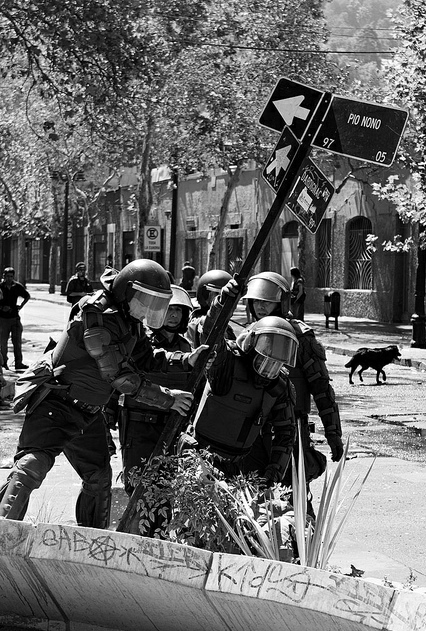



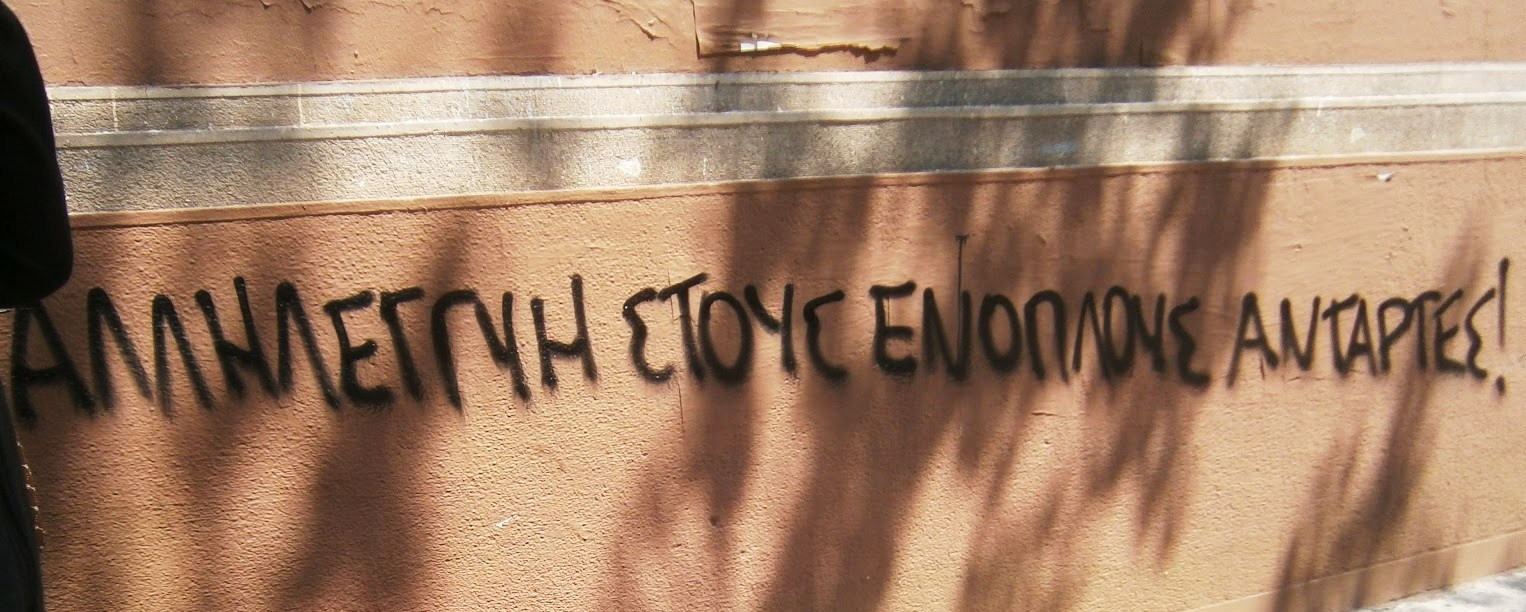

![Eurorepressione - Sulla conferenza a Den Haag sul tema "Anarchia" [corretto]](http://25.media.tumblr.com/tumblr_m0jvngOXtY1qa2163o1_1280.jpg)

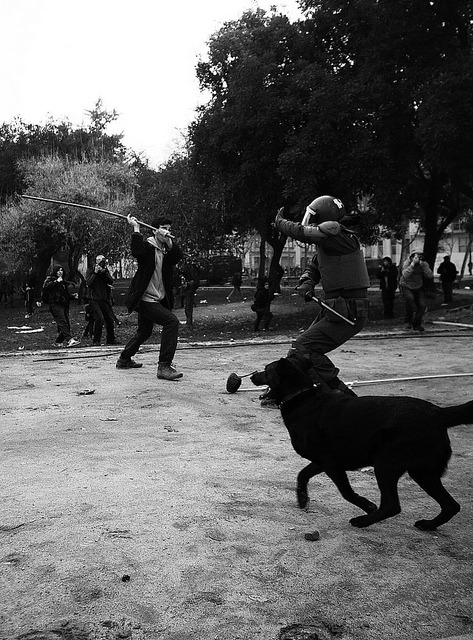
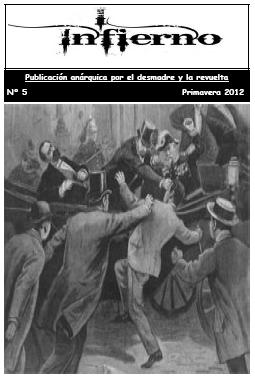
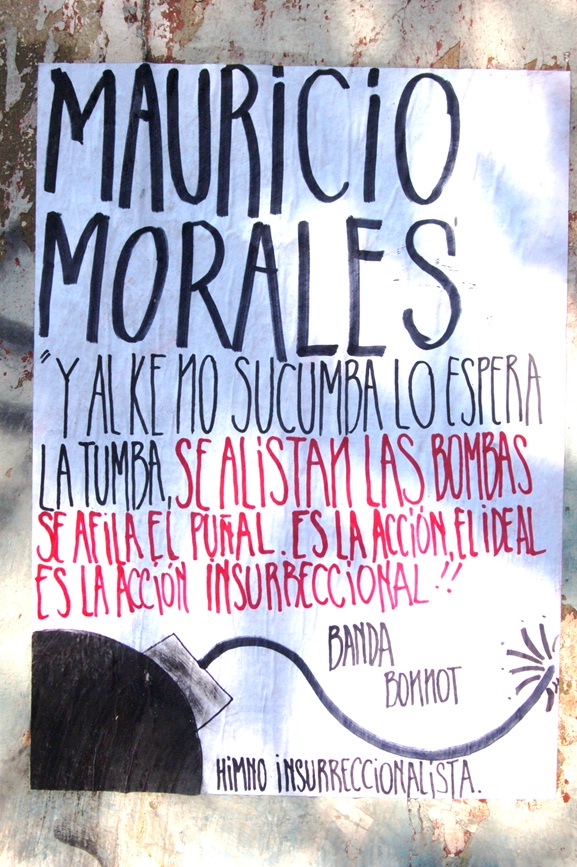
![A tres años de la Partida de Mauricio Morales: De la Memoria a la Calle [Stgo.]](http://metiendoruido.com/wp-content/uploads/2012/05/mmacividad.jpg)
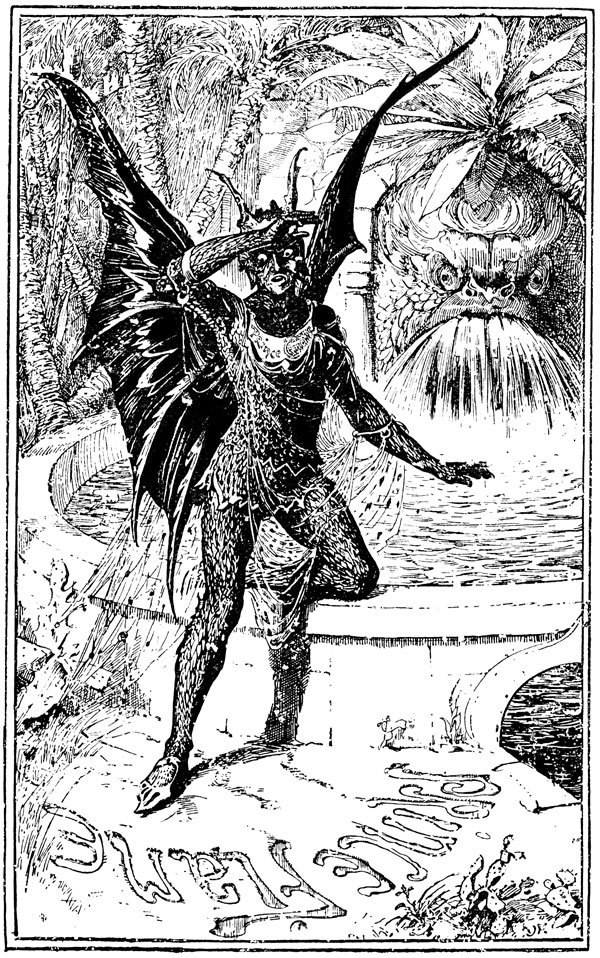




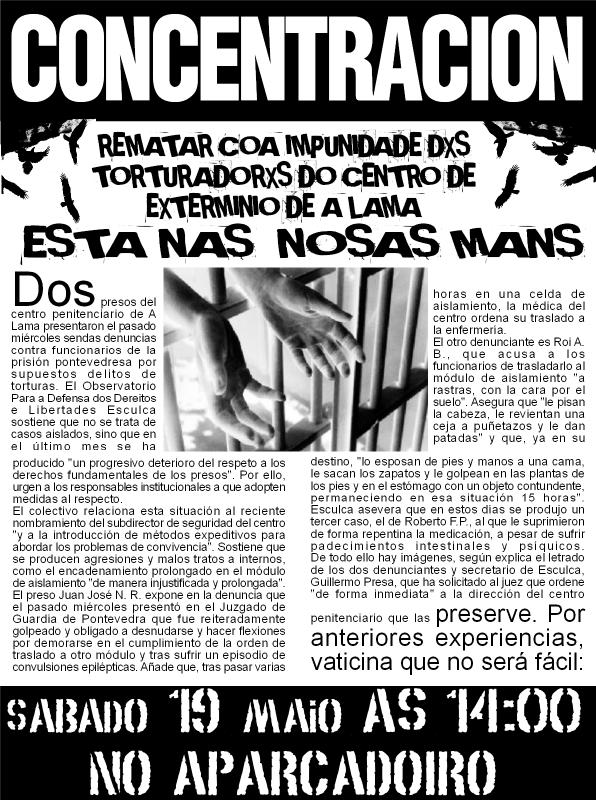




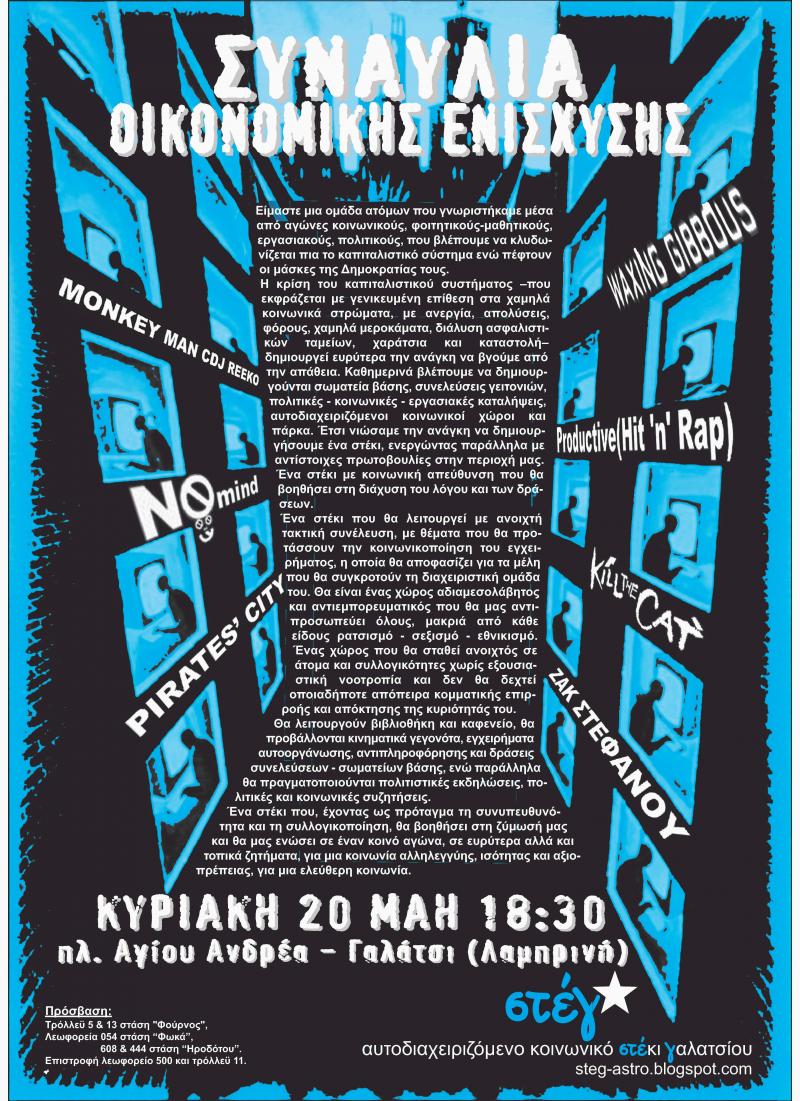








Nessun commento:
Posta un commento